Here is a roundup of stories from The Canadian Press designed to bring you up to speed...
The key pieces of Trudeau’s political legacy
Prime Minister Justin Trudeau announced Monday he will resign as prime minister and Liberal leader once the party chooses a successor. Trudeau, who was first elected Oct. 19, 2015, steps down after nearly a decade in power. Here are the key pieces of his political legacy.
On Oct. 17, 2018, cannabis became legal in Canada. Legalization sparked a new industry, with a domestic recreational market now valued in the billions. Cannabis legalization was one of the campaign promises Trudeau made in the 2015 election that saw him win a landslide majority government.
Andrew McDougall, an assistant professor in the department of political science at the University of Toronto, said cannabis legalization was "a political debate in Canada literally for decades."
"While I think people are still fighting about the public health implications of that," legalization is "here to stay," he said.
Here's what else we're watching...
Liberal party begins process to succeed Trudeau
As Liberal party brass begins to chart course for an expedited race to find Justin Trudeau's successor, potential contenders are weighing whether or not to join the fray -- including former central banker Mark Carney.
The former Bank of Canada governor issued a statement Monday evening saying he is encouraged by support he has heard, and that he's considering his decision with family over the next few days.
Party officials are expected to meet this week to begin the process for selecting the new leader.
Parliament is prorogued until March 24, but leaders of the main opposition parties say they will bring down the government at the earliest opportunity.
That means Canadians will likely head to the polls this spring.
Prorogation puts capital gains proposal in limbo
Justin Trudeau's decision to step down and prorogue Parliament will keep his government from implementing its proposed changes to capital gains for now, but Canadians might not be off the hook with tax collectors just yet.
The changes would raise the portion of capital gains on which companies pay tax to two-thirds from one-half. The policy would also apply to individuals with capital gains earnings above $250,000.
The changes were announced in the government’s April budget, and subsequently introduced as a notice of ways and means motion. Those changes did not pass due to the gridlock in Parliament over Conservative demands for documents related to alleged misspending in the government's green technology fund.
Proroguing clears the parliamentary order paper, meaning bills and motions would have to be reintroduced after the House of Commons resumes.
That process could be delayed or completely scuttled if the Liberals don’t survive a non-confidence vote widely expected soon after a new parliamentary session begins on March 24.
B.C. ferries only link to necessities: resident
A resident of Glade, B.C., says the small community is "on a knife's edge" despite a temporary reprieve from disruptions in the cable ferry service serving as its only link to "basic necessities of life."
Deborah Johnson said Monday that no one in the 120 or so households in the Kootenay-area village feels assured, despite Western Pacific Marine saying the ferry it operates there will be running as normal this week "and indefinitely."
The announcement comes after the company applied for and received a stay from the province's Labour Relations Board of an earlier ruling that would have allowed union workers to expand their strike action on the free Kootenay Lake and river crossings, starting Monday.
That would have resulted in disruptions for ferry service at Glade and nearby Harrop, about 57 kilometres to the northeast.
Western Pacific Marine said a new hearing was being planned for a reconsideration of the original order, and the board will announce the hearing dates next week.
Study reveals sneezing sea sponge near B.C. coast
A study into the behaviour of a sea sponge off the coast of British Columbia has revealed the animals have the humanlike ability to sneeze.
Researcher Sally Leys said her team examined footage captured over a span of four years by eight cameras installed on the sea floor by Ocean Networks Canada in an effort to study the sponge's response to the changing climate and weather patterns.
She said they observed the sponge performing regular “sneeze-like” contractions lasting upwards of a day at a time to clear debris that accumulated while it was filter feeding.
Belinda was the nickname researchers gave to the sea sponge they focused their study on, which Leys noted is about the size of a fist.
She said it was "a pretty active critter," although if a diver went down to view the sponges in their natural habitat — like a plant in the garden — it would seem unmoving.
This report by The Canadian Press was first published Jan. 7, 2025.
The Canadian Press
